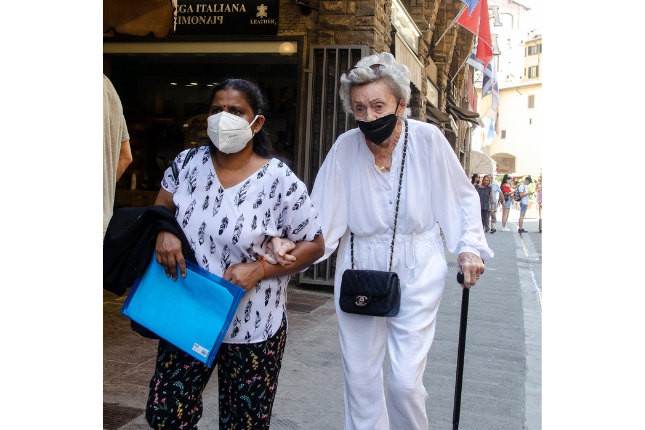-
New Global Health & Gender Policy Brief: Migrant Care Workers and Their Families
January 11, 2023 By Maternal Health Initiative Staff
Migrant care work is a key component of the ongoing global care crisis. The global care economy is critical to overall economic growth, and also affects gender, racial, and class and caste equity and empowerment. Caregiving is also the fastest-growing economic sector in the world—projected to add 150 million jobs by 2030. Global societal changes, like low birth rates, demographic aging, and an increase in female labor force participation, are basic drivers of the continued growth of this sector. But because in many cultures care work is considered “instinctive” for women—a type of work not requiring skill—it has remained virtually invisible, unpaid or underpaid and unregulated. It is also often stigmatized, especially when relegated to already marginalized and underrepresented populations.
This policy brief serves as an overview of the effects of the pandemic on migrant care work, particularly female caregivers and their families. In this brief, we propose ways for policymakers and practitioners to utilize the current spotlight on care work to garner support to make lasting change in the status and working conditions of migrant care workers. The information provided in this brief was informed by a larger white paper, Pandemic Learning: Migrant Care Workers and Their Families are Essential in a Post-COVID-19 World, that additionally includes a section on activism among and in support of migrant care workers and provides regional highlights on the response to COVID-19 in the Asia-Pacific and the experiences of families of migrant workers in Sub- Saharan Africa.
Migrant Care Workers and Th… by The Wilson Center
Global migration patterns are vast, and many factors propel people to migrate for paid work. For some, migration allows for better job prospects, higher pay, opportunities for job training and advancement, and safer work conditions. But for others, it is a reluctant choice, perhaps driven by gender restrictions, civil war or ethnic conflict, political instability, food insecurity, or a lack of the kind of educational and job opportunities potentially available in receiving countries.
Migration does not resolve all of these problems and while female migrants may be prompted to leave because of gender oppression at home, they do not necessarily escape discrimination once they reach their destinations. Woman migrants are particularly invisible in destination countries because they have restricted access to society and public spaces while employed in private homes. Often they experience social and cultural isolation due to language and cultural differences and, if undocumented, feel compelled to maintain a low profile.
Families of migrant care workers are also deeply affected by their family-member’s migration. Studies of left-behind children (LBC) find varied results, a strong reminder that migrants and their families are not homogeneous. Some studies of LBC found that they have more emotional and behavioral problems than non-LBC, particularly mental health disorders, hyperactivity, and peer relationship issues, while others have found that remittances from abroad improve the education and well-being of family members remaining at home.
Further, the complexity of family dynamics, level and quality of care received by LBC, economic variance between receiving and sending countries, and prevalence of emigration in a sending country can also be associated with the overall well-being of those remaining in the sending country.
Greater investments are necessary in data, research and immigration policy and reform to improve the living and working conditions of migrant care workers and improve support to their families remaining in the sending country. Immigrations laws must be reformed to ensure care workers are included as “essential” and “high skilled” and are eligible for work visas similar to other essential and high skilled migrant workers. Policies need to address the particular challenges experienced by women due to their intersectional identities and should include access to health services, to include access to vaccinations and reproductive and mental health services. In addition, migrant care workers, particularly those in under researched areas, must be included in public health and health workforce research to help inform improved immigration policy and reform.
This Global Health & Gender Policy Brief was made possible through the generous support of EMD Serono, the healthcare business of Merck KGaA, Darmstadt, Germany.
Sources: Cogent Economics & Finance, International Labour Organization, Journal of Population Economics, MDPI, Migration Policy Centre
Photo Credit: Eric Parker / Flickr. Attribution-NonCommercial 2.0 Generic (CC BY-NC 2.0)
 A Publication of the Stimson Center.
A Publication of the Stimson Center.



